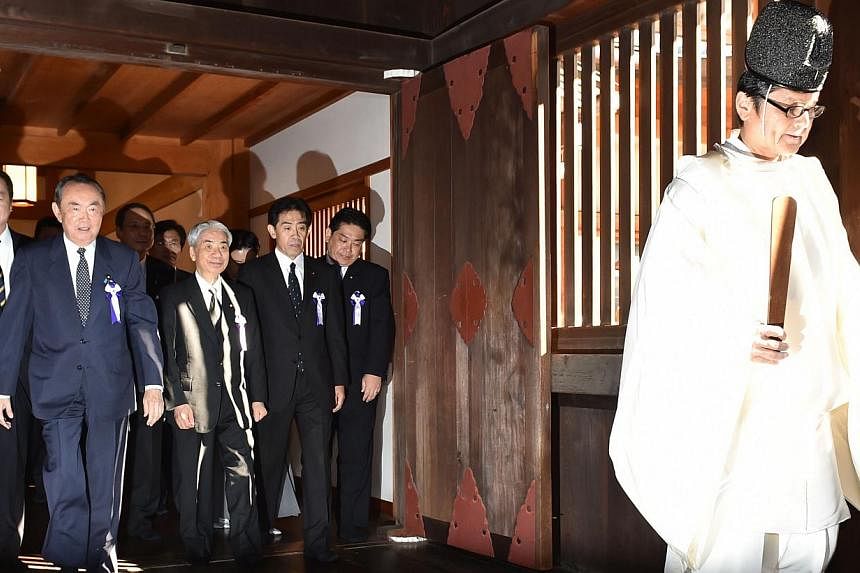TOKYO (AFP) - More than 100 Japanese lawmakers on Friday visited a Tokyo shrine condemned by China and Korea as a symbol of Japan's militarist past. A cross-party group of parliamentarians said 110 members paid homage at the Yasukuni Shrine at the beginning of a four-day autumn festival.
Prime Minister Shinzo Abe, who infuriated Beijing and Seoul by visiting the shrine in December last year, is unlikely to go there even after he returns home on Saturday from an Asia-Europe summit in Italy. He instead sent a ritual donation to the shrine, media reports said.
Mr Hidehisa Otsuji, who led the group of lawmakers, said it was only "natural" that they visit the shrine to offer gratitude to the people who sacrificed their lives for the country. "People in any country pay homage to those who died for the sake of their countries," he told reporters at the shrine. "It is odd that Japanese people are told off over doing what is also practised in any country" in the world, he said.
Beijing on Friday strongly condemned the visit, saying the move would ratchet up tensions between the Asian giants. "China is gravely concerned and firmly opposes the negative activities in Japan surrounding the Yasukuni Shrine," Foreign Ministry spokesman Hong Lei said in a statement.
The group visited Yasukuni during its spring and autumn festivals as well as on the August 15 anniversary of Japan's surrender in World War II.
Japan's neighbours view pilgrimages there by high-profile politicians as an insult and a painful reminder of Tokyo's aggression in the first half of the 20th century.
No ministers in Abe's current government was sighted at the shrine Friday morning.
Health, Labour and Welfare Minister Yasuhisa Shiozaki sent a tree offering as Mr Abe did, according to media reports.
The Prime Minister is believed to have one eye on budding signs of an improved relationship with China, with view to a possible summit on the sidelines of a major international meeting next month.
He stayed away from Yasukuni this year and made donations there for the spring festival and on the war anniversary on August 15.
His visit in December 2013 drew an angry reaction from Japan's neighbours.
It also earned Mr Abe a diplomatic slap on the wrist from the United States, a key ally, which said it was "disappointed" by the decision, with regional relations already strained over territorial disputes and vastly different views of history.
Both South Korea and China reacted with renewed anger to the last annual pilgrimage by lawmakers in August.
Chinese Foreign Ministry spokesman Hua Chunying said Beijing was "firmly opposed" to both the visits and Mr Abe's donation, while South Korea called on Japan's leadership to "abandon their revisionist attitudes".
The 145-year-old Shinto shrine honours some 2.5 million citizens who died in World War II and other conflicts. But it is highly controversial because war criminals are among their number, including senior figures in the WWII administration, such as General Hideki Tojo, who authorised the attack on Pearl Harbour.

